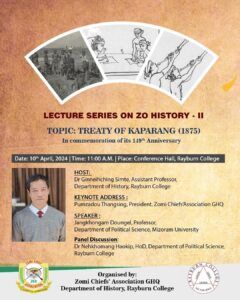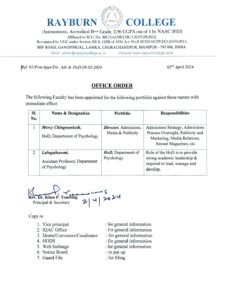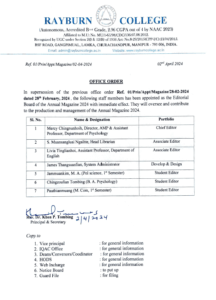DEPARTMENT OF HISTORY
Rayburn College
- About
- Vision
- Mission
The department of History was established in the year 2003 with Under-graduate program (General and Honours). Post-graduate program in History started in 2021. History being the bridge that connects the past to the present and pointing the path towards the future, it is a major subject taught in various universities all over the World. Owing to its holistic approach, Marc Bloch has aptly regarded History as the “Mother of all subjects”.
In the study of History, the focus of the department is to nourish the in-depth understanding of the course by the students. The subject, being a major area of academics in Manipur in general and that of the country in particular, is a vital choice of subject for future prospects besides academic pursuits. In every academic year, a good number of students opted History among the Social Sciences discipline offered by the college.
Our students showed enthusiasm in the studies of archaeology and its methods, utility of sources and their role in the reconstruction of history, the rise and fall of dynasties, changes throughout history, failures and achievements of personalities, impact and consequences of major as well as minor events. It is not lost on the department that students faced major challenges in the programme.
Another set of drawbacks is seen in the limitation of site visits and exposure to the rich material culture of History. As such, in order to conform to our students’ zeal of learning and understanding of the subject, the faculty is working in earnest by adopting variant teaching methods and interactive sessions.
Further, students of our college need a formal career counselling and workshop with experts in the various field of History. For general understanding of the comprehensive nature of the subject, it must be reiterated that the subject is not only confined to academic and research. Opting History at undergraduate level is extremely favorable for those making career not only in history but also in its interdisciplinary field, popular careers like Staff Selection Commission and Civil Services for both the center as well as the state. There are lots of career opportunities in this subject such as archaeologists, museologists, curators, archivists/librarianship, historians, teachers, law, publishing, journalism and the media, global charity works, etc.
- To provide students with transferable skills, employability skills, and intellectual curiosity, and to promote public awareness of the past and its heritage through teaching, research, and service activities at the regional, national, and international levels;
- The department strives to develop new pedagogical tools;
- The department promotes participatory learning methods. The department organizes student seminars, quiz competitions, group discussions, and open debates to educate students. Field trips to historical sites, museums, and tourist destinations are regularly organized. Students are required to prepare site visit reports;
- The department is innovative in using various participatory forms of examination. Students are asked to write book reviews, visit reports, seminar conference reports, and workshops, etc.;
- The department uses modern technologies like LCD projector and internet etc. for teaching;
- In order to link the history curriculum to contemporary challenges and apply the learning of history in an academic environment full of critical engagement, the department is considering offering various certificate and diploma courses in the future;
- The department is committed to developing interdisciplinary inquiry in the field of history. It will broaden the field of history by incorporating various historical fields of study such as archaeology, social history, cultural studies, anthropology, and Indology;
- The department strives to become the premier department of historical studies.
- Make students citizens who are critically informed about the past and the implications for the present;
- Conduct an excavation or exploration of neglected historical sites or regions;
- Empowering students to deal with the challenges of globalization by instilling in them a lifelong passion for learning about the past; and
- Improving the numerical graph of higher education among the region’s youth; enriching the quality and standard of teaching and learning through modern technology and science; creating a solid research background, excellent human resources with versatile personalities, and thereby strengthening overall regional progress and development.
Events & Activities












